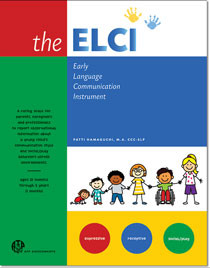Early Language Communication Instrument (ELCI)
Complete Kit
- Ages 18 months through 5 years 11 months
- Testing Time 15 minutes
- Scoring Time 5 - 10 minutes
- Administration Individual
- Copyright 2024
-
Product Code 2627-7 ( MR #069843 )
* Qualifications required to purchase this item. Click here to complete the qualifications form.
Price $234.00
Contents
The Early Language Communication Instrument (ELCI) is a rating scale that elicits information about a child’s observed receptive and expressive language and social/play skills. The ELCI can be completed by a Rater—a parent, caregiver, teacher, or daycare provider, then scored and interpreted by an Assessor—an SLP, school psychologist, neuropsychologist, or other professional. It can be used as a companion to directly administered tests and provides normative data in all three domains based on the reported observations, which can assist with eligibility and diagnostic information. The ELCI is especially helpful to use with children who are not able to participate in direct testing or who function differently across different environments. The ELCI provides normative information about:
- Expressive language
- Receptive language
- Social communication and play skills
The ELCI was standardized on a nationally representative sample of 605 children ages 18 months through 5 years, 11 months.
Administration and Scoring
The ELCI can be completed in about 15 minutes by an adult familiar with the child’s behaviors. Scoring by a professional Assessor can be completed in 5–10 minutes. Scaled scores are provided for each subtest, and a standard score is provided for the overall score. Discrepancy scores allow comparison of performance across domains.
Reliability and Validity
Cronbach’s alpha values ranged from 0.91 to 0.98 for subtest and overall scores. Test-retest correlations were 0.93 to 0.99 for subtest and overall scores. The ELCI was shown to differentiate individuals with autism spectrum disorder, social communication disorder, attention-deficit/hyperactivity disorder, speech and/or language delay, and Down syndrome from typically developing peers.
No additional information available for this item.

 Proud to be Canadian
Proud to be Canadian

